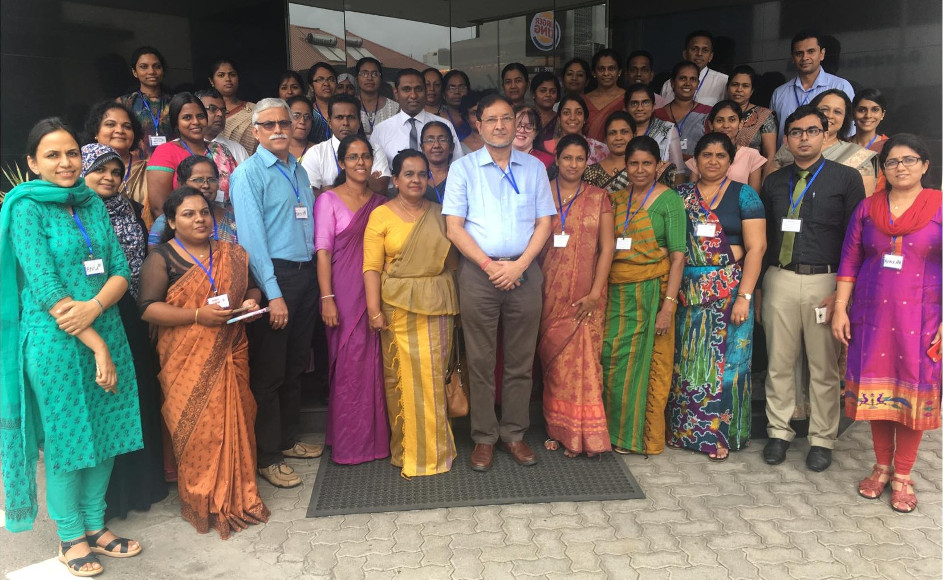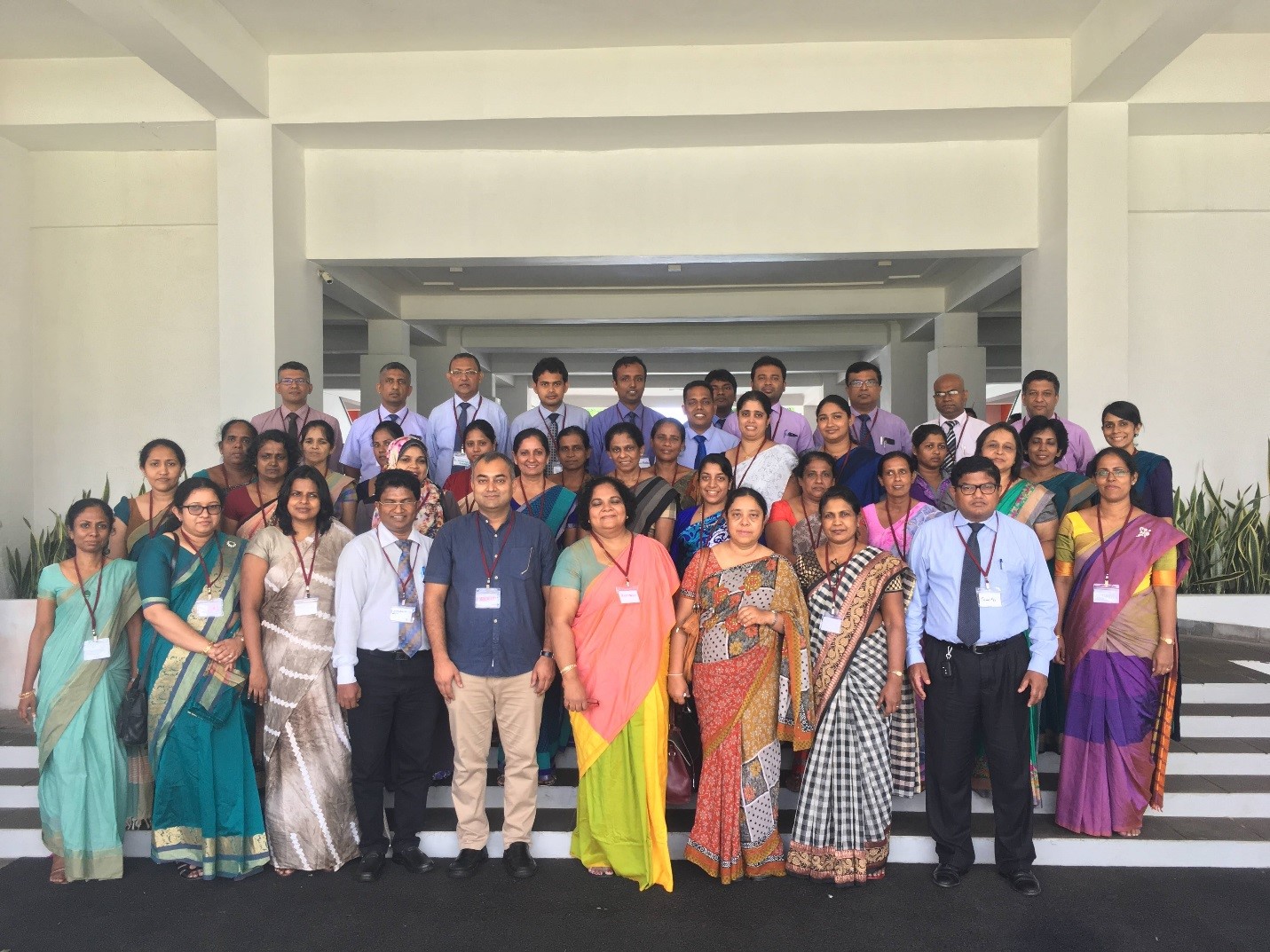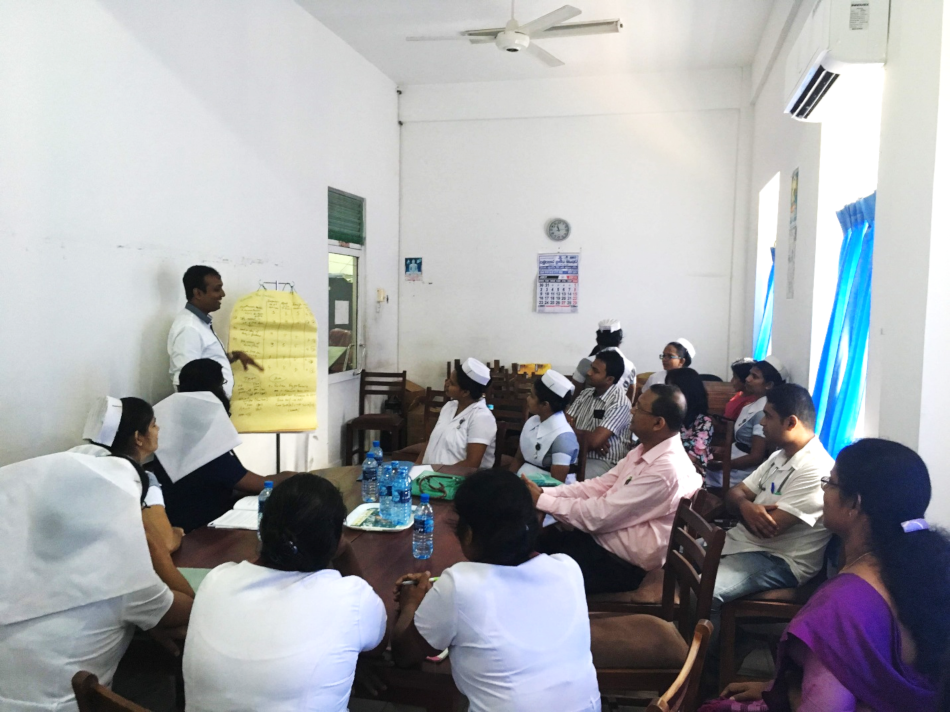
BUILDING SKILLS FOR QUALITY IMPROVEMENT
There is great impetus for quality improvement from the Family Health Bureau and WHO, and UNICEF in Sri Lanka. A team from Sri Lanka first attended the Regional Workshop for Improving Quality of Hospital Care for Maternal and
New-born Health, 6 – 8 February 2017, New Delhi, India, where the concepts were introduced. Following which the teams completed a QI project from the neonatology division in Anuradhapura on preventing readmissions due to dehydration Fever.
The QI movement was adopted in a big way when WHO organized a “Capacity Building Workshop for Point of Care Quality Improvement for mothers and new-borns in Improving facility-based care around child-birth from 22-24 August 2017 in Colombo. In this program teams from 7 hospitals from all over the country were invited to understand the methodologies and plan a QI project. The workshop started with a facilitators training on day 1 where local professionals were trained who then facilitated teams on day 2 and 3 with the help from experts from AIIMS, New Delhi and WHO.
The purpose of the training was to develop capacity at the national level for hands-on guidance along with the remote hand holding by the QI faculty. Six QI projects were planned after the QI workshop:
In July 2018, UNICEF Sri Lanka, WHO Country office, and Family health Bureau (FHB) and UNICEF ROSA organised workshops and in-facility visits for building capacity of doctors and nurses in select hospitals on Point of Care Quality Improvement (POCQI). First in this series was an experience sharing workshop on 16 July 2018, where staff from health facilities trained in 2017 shared their quality improvement projects.
COMPLETED IMPROVEMENT PROJECTS SHARED BY HEALTH FACILITIES IN REFRESHER TRAINING AND EXPERIENCE SHARING WORKSHOP, FHB AUDITORIUM, COLOMBO, 16 JULY 2018
| Facility name | Improvement project/aim | Remarks |
|---|---|---|
| DGH Kalutara | To increase the percentage of babies in NICU who receive at least 10ml/kg/day EBM (within 3 hr. after the request), when they were fit enough to be fed, from 32% to 60% in 8 weeks | Achieved aim, working on a new project, and coaching another facility |
| De Soysa Hospital for Women, Colombo | To reduce prolonged stay (>48 hrs after birth) in the post-natal ward due to feeding problems in normal term babies delivered vaginally from 30% to-20% within 3 months | Reduced to 18.5% in three months |
| Teaching Hospital Anuradhapura | To increase the duration of skin to skin contact following Normal Vaginal Deliveries at LR- from a few minutes to one hour from 0% to 100% by the end of September 2017 | Achieved 100% performance and maintained between 90-100% in follow up period |
| District Base Hospital, Dickoya | Improve Kangaroo Mother Care (KMC) in new-borns with Low Birth Weight(<2.5kg) from very low level to 50% within six weeks | Improved but could not sustain. Documented reasons for non-sustenance and improved performance after infrastructure development. |
| Castle street Hospital, Colombo | To reduce the readmission due to infected episiotomy wounds at ward 10, CSHW in healthy mothers who underwent episiotomy from current to zero level within 3 months | Achieved zero readmissions due to infected episiotomy wounds |
| Teaching Hospital, Mahamodara | To improve hand washing / hand rubbing of staff members prior to handling neonates, by 25% from the baseline in Special Care Baby Unit of Teaching Hospital Mahamodara, within one month | Improved hand hygiene compliance from 64% to 100% and sustained over 20 weeks. Infection rates among babies in unit gradually reduced from 8% in Jan 2017 to 2% in Dec 2017 |
FHB plans to scale up quality improvement covering one province at a time and building upon existing capacity in health facilities. In this regard, a workshop was conducted for new quality improvement teams in health facilities from southern province in Hikkaduwa on 18 and 19 July 2018. This workshop was held with assistance from local facilitators identified among previously trained healthcare providers, FHB and WHO/UNICEF. Facilitators conducted post-training follow up visits to these health facilities and each facility was assigned a coach for follow up support.
NEW QI PROJECTS PLANNED BY HOSPITAL TEAMS FROM SOUTHERN PROVINCE, SRI LANKA DURING POCQI WORKSHOP IN HIKKADUWA, SRI LANKA, 18-19 AUGUST 2018
| Facility name | Improvement project/aim |
|---|---|
| Base Hospital, Deniyaya | To reduce the infected episiotomies among mothers who delivered at Base Hospital Deniyaya from (30% to 10%) * within one month (1st August to 31st August) *estimated figures |
| Base Hospital, Kamburupitiya | To reduce hypothermia among babies born by LSCS on admission to NICU from 50% to 25% in two months |
| Base Hospital, Elpitiya | To increase hand washing/hand rubbing before examination of each new-born in the post-natal ward from baseline to 40% within 2 months from 1st of August to 30th September 2018. |
| Base Hospital, Balapitiya | To increase the percentage of mothers who are discharged at the next immediate visiting hour, after discharge decision has been made, in all postnatal discharges from ward 9 at Base Hospital Balapitiya from (60% to 80%) *, within 4 weeks starting on 1st Aug 2018 |
| District General Hospital, Matara | To reduce readmission due to lactation failure for normal babies born through uncomplicated vaginal or caesarean deliveries from (x% to y%) * in two months |
| District General Hospital, Kalutara | To reduce the percentage of hypothermic neonates admitting to NICU from the OT, from 75 % to 25%, over a period of 6 weeks from 30th July 2018 |
| Teaching Hospital, Karapitiya | To reduce the incidence of hypothermia among post-surgery babies returning to NICU from OT from 100% to 50% in 6 weeks |
| Teaching Hospital, Mahamodara | To improve the percentage of eligible mothers receiving lignocaine injection prior to performing an episiotomy in labour room 1, Teaching Hospital, Mahamodara from estimated 40% to 70% within one month from 1 Aug to 31 Aug |
Maternal and New-born Care Programme in Sri Lanka is now focusing on further improvement of quality of MNH services with the objective of achieving SDG targets and reducing morbidities among mothers and babies. Family Health Bureau of the Ministry of health together with WHO and UNICEF has introduced ‘Point of Care Quality Improvement” techniques for hospital staff engaging in MNH services. The third national capacity building session was held in Anuradhapura on 17 and 18 of October for hospital staff from North Central province and Puttalam district with the participation of 65 staff.
SHARING QUALITY IMPROVEMENT EXPERIENCES
Coaching support to Sri Lanka for webinar: District general hospital, Kalutara, Sri Lanka has completed an improvement project on initiation of expressed breast use among new-borns admitted in intensive care unit. Dr Sandhya Doluweera from KalutaraHospital presented her work in a webinar on 12 October.
| Date | Title | Video/Slides |
|---|---|---|
| Friday, 12th October 2018 | A healthy start” An NICU team in Sri Lanka improves breastfeeding practices | Video: Webinar 6 of 12th October 2018 Slides: Webinar Sri Lanka improves breastfeeding practices |





